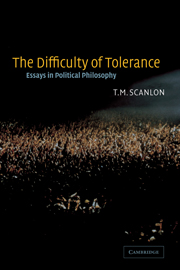Book contents
- Frontmatter
- Contents
- Acknowledgments
- Introduction
- 1 A theory of freedom of expression
- 2 Rights, goals, and fairness
- 3 Due process
- 4 Preference and urgency
- 5 Freedom of expression and categories of expression
- 6 Human rights as a neutral concern
- 7 Contractualism and utilitarianism
- 8 Content regulation reconsidered
- 9 Value, desire, and quality of life
- 10 The difficulty of tolerance
- 11 The diversity of objections to inequality
- 12 Punishment and the rule of law
- 13 Promises and contracts
- Index
11 - The diversity of objections to inequality
Published online by Cambridge University Press: 15 December 2009
- Frontmatter
- Contents
- Acknowledgments
- Introduction
- 1 A theory of freedom of expression
- 2 Rights, goals, and fairness
- 3 Due process
- 4 Preference and urgency
- 5 Freedom of expression and categories of expression
- 6 Human rights as a neutral concern
- 7 Contractualism and utilitarianism
- 8 Content regulation reconsidered
- 9 Value, desire, and quality of life
- 10 The difficulty of tolerance
- 11 The diversity of objections to inequality
- 12 Punishment and the rule of law
- 13 Promises and contracts
- Index
Summary
I believe that equality is an important political goal. That is to say, virtually every society is marked by forms of inequality the elimination of which is a political objective of the first importance. But when I ask myself why I think it so important that these inequalities should be eliminated, I find that my reasons for favoring equality are in fact quite diverse, and that most of them can be traced back to fundamental values other than equality itself. The idea that equality is, in itself, a fundamental moral value turns out to play a surprisingly limited role in my reasons for thinking that many of the forms of inequality which we see around us should be eliminated.
When I say that the idea of equality plays surprisingly little role in my thinking here, I have in mind an idea of substantive equality – that it is morally important that people's lives or fates should be equal in some substantive way: equal in income, for example, or in overall welfare. This is in contrast to a merely formal notion of equal consideration, as stated for example in the principle that the comparable claims of each person deserve equal respect and should be given equal weight. This is an important principle. Its general acceptance represents an important moral advance, and it provides a fruitful – even essential –starting point for moral argument. But taken by itself it is too abstract to exercise much force in the direction of substantive equality.
- Type
- Chapter
- Information
- The Difficulty of ToleranceEssays in Political Philosophy, pp. 202 - 218Publisher: Cambridge University PressPrint publication year: 2003
- 29
- Cited by



